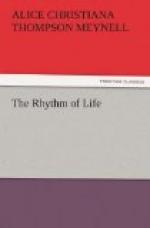has less intellectual imagination than intelligent
fancy. For example: ’If you ever
saw a crow with a king-bird after him, you will get
an image of a dull speaker and a lively listener.
The bird in sable plumage flaps heavily along his
straightforward course, while the other sails round
him, over him, under him, leaves him, comes back again,
tweaks out a black feather, shoots away once more,
never losing sight of him, and finally reaches the
crow’s perch at the same time the crow does;’
but the comparison goes on after this at needless length,
with explanations. Again: ’That blessed
clairvoyance which sees into things without opening
them: that glorious licence which, having shut
the door and driven the reporter from the keyhole,
calls upon Truth, majestic Virgin! to get off from
her pedestal and drop her academic
poses.’
And this, of the Landlady: ’She told me
her story once; it was as if a grain that had been
ground and bolted had tried to individualise itself
by a special narrative.’ ’The riotous
tumult of a laugh, which, I take it, is the mob-law
of the features.’ ’Think of the Old
World—that part of it which is the seat
of ancient civilisation! . . . A man cannot help
marching in step with his kind in the rear of such
a procession.’ ’Young folk look
on a face as a unit; children who go to school with
any given little John Smith see in his name a distinctive
appellation.’ And that exquisitely sensitive
passage on the nervous outward movement and the inward
tranquillity of the woods. Such things are the
best this good author gives us, whether they go gay
with metaphor, or be bare thoughts shapely with their
own truth.
Part of the charm of Dr. Holmes’s comment on
life, and of the phrase wherein he secures it, arises
from his singular vigilance. He has unpreoccupied
and alert eyes. Strangely enough, by the way,
this watchfulness is for once as much at fault as
would be the slovenly observation of an ordinary man,
in the description of a horse’s gallop, ‘skimming
along within a yard of the ground.’ Who
shall trust a man’s nimble eyes after this,
when habit and credulity have taught him? Not
an inch nearer the ground goes the horse of fact at
a gallop than at a walk. But Dr. Holmes’s
vigilance helps him to somewhat squalid purpose in
his studies of New England inland life. Much
careful literature besides has been spent, after the
example of Elsie Venner and the Autocrat,
upon the cottage worldliness, the routine of abundant
and common comforts achieved by a distressing household
industry, the shrillness, the unrest, the best-parlour
emulation, the ungraceful vanity, of Americans of the
country-side and the country-town; upon their affections
made vulgar by undemonstrativeness, and their consciences
made vulgar by demonstrativeness—their
kindness by reticence, and their religion by candour.




